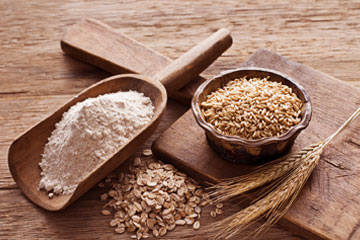Each year, September is observed as Whole Grains Month by Whole Grains Council (WGC) to celebrate the goodness of whole grains. Though WGC recommends whole grains all the year round, the month of September is specifically dedicated to encouraging companies and consumers to pay attention to the health benefits of whole grains. WGC features a different whole grain on its website every month. September is being also celebrated as the 20th anniversary of National Rice Month.
This year, WGC embarks on “Whole Grains: the World Tour!” to take grain enthusiasts on a culinary excursion, exploring the traditions, flavors, and ingredients of the four beloved regions of the world – the Mediterranean, Asia, Latin America, and the African diaspora.
Whole grains have always played a vital role in the lives of humans. Unlike refined grains which lose valuable nutrients in the refining process, whole grains offer a “complete package” of health benefits such as lower risk of diabetes, heart disease, and high blood pressure.
All whole grain kernels contain three parts -bran, germ, and endosperm-in the original proportions.
- The bran is the fiber-rich outer layer that supplies B vitamins, iron, copper, zinc, magnesium, antioxidants, and phytochemicals.
- The germ is rich in healthy fats, vitamin E, B vitamins, phytochemicals, and antioxidants. It is the core of the seed where growth occurs.
- The endosperm is the interior layer that holds carbohydrates, protein, and small amounts of some B vitamins and minerals.
Wheat, brown rice, oats, barley, quinoa, buckwheat, bulgur, whole-wheat couscous, sorghum, rye are some of the whole grains to include in your daily diet. The United States Dietary Guidelines recommend 3 full servings, or 3 ounces, of whole grains a day for adults and two servings for children.
To add more whole grains to your diet and boost the dietary fiber content of your meals, change your cooking style to include more whole grains. Here are some tips to help:
- Switch from white flour to whole wheat flour in your regular recipes
- Eat oatmeal for breakfast as it has a powerful effect in lowering total cholesterol
- Replace one third of the flour in a recipe with quick oats or old-fashioned oats
- Try brown or wild rice instead of white rice, or whole-grain pasta
- Use whole-grain bread
- Add half a cup of cooked bulgur, wild rice, or barley to bread stuffi
- Munch on popcorn instead of chips and pretzels
- Add half a cup of cooked wheat or rye berries, wild rice, brown rice, sorghum or barley to your favorite home-made soup
- Use whole corn meal for corn cakes, corn breads and corn muffins
- For quick crunch, put a handful of rolled oats in your yogurt
Remember to soak whole grains overnight to speed up the cooking process.
